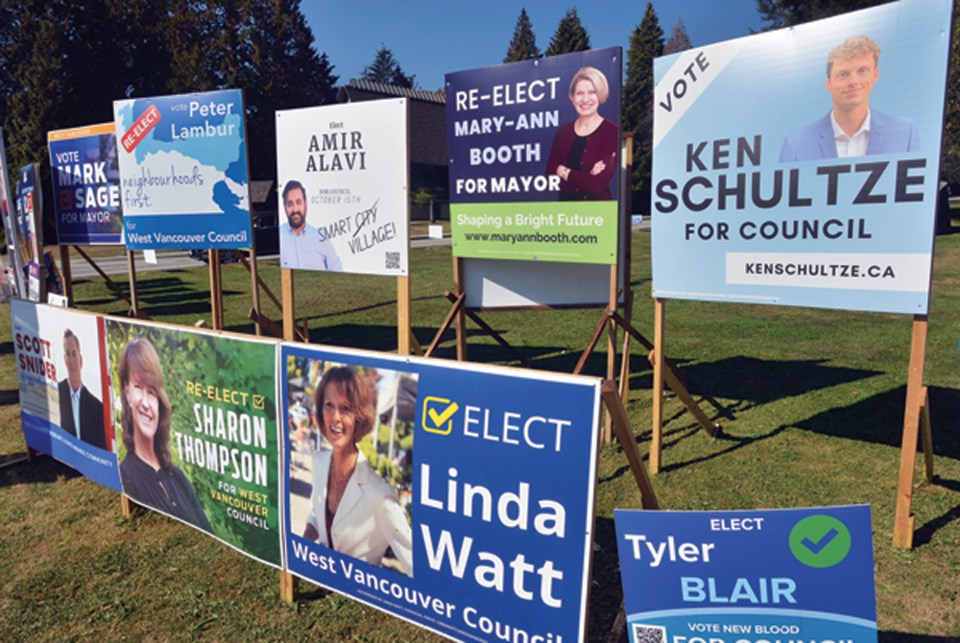Hands up if you plan to vote in the municipal election on Oct. 15.
OK, I only see about one in four of you with your hands up.
This prediction is based on the voter turnout record over the past five elections in the three major North Shore municipalities.
When it comes to voter turnout and engagement in municipal elections, we perform very poorly across the province.
So poorly that that winners in local elections would struggle to legitimately claim they represent the popular will of the people.
Fortunately, there are contested races for mayor in all three North Shore municipalities.
This is a good thing since competitive mayoral races provide voter choice and typically increase voter turnout.
So, if we are lucky, maybe one in three people will vote. Oooh, fantastic!
No matter which way you slice it, for those who care about the health of our democracy and the claim that Canada is an advanced liberal democracy and beacon for other democracy-aspiring countries, I believe these voting numbers represent an abject failure.
It’s true that it takes more effort to vote in local elections with the number of candidates for council and an election for school trustees.
But really can’t we give up watching the latest couple of episodes of your favourite streaming show and do a little candidate research to get informed and vote?!
This historic level of disengagement is now combined with growing distrust, disinformation and attacks on elected representatives and democratic institutions.
Craig Cameron, a three-time councillor in West Vancouver is quoted recently in the North Shore News as saying the “steep decline in civic discourse from a ‘vocal minority’” has contributed to his decision to not run again for council.
So, given the really lousy state of voter engagement at the local level, what are we doing to defend democracy, encourage and engage the electorate to get informed and vote?
Unfortunately, not enough, in my view.
Of course, candidates work to engage voters as they must if they are to win votes.
But what of the municipalities’ efforts?
Sure, there is basic information on local government websites, sometimes election flyers delivered to homes and organizations. One local government even funded a youth-focused organization to get that important demographic engaged which is laudable though it is the municipality with a relatively low number of young people and many more older adults who don’t vote.
Unfortunately, the Union of BC Municipalities, the clearinghouse for support for municipalities across B.C., doesn’t make voter engagement a priority either.
One of the challenges is that local elections occur every four years and there is no regular machinery and staff in place to mount effective voter engagement campaigns. Have mayors and councils made this is a priority?
Knowing how abysmally low voter turnout is on the North Shore, my organization, North Shore Community Resources and our Democracy Café program approached two local governments for funding many months ago to hire non-partisan Voter Outreach Ambassadors – yes, real people you can talk to! – to hit the streets, create some election buzz and help voters find out where they can get more information. We were also ready to work with the many North Shore not-for-profit organizations we collaborate with to get the word out to the thousands of clients we assist with.
We were unsuccessful.
Despite a lack of resources, working with Impact North Shore, we have created a Municipal Elections Voters Guide available in English, Chinese and Farsi. Check it out online.
But this lukewarm interest in a serious and strategic effort of voter engagement is consistent with our society’s lack of commitment and investment in democratic engagement at any level of government.
So after this election, my next project will be to talk to newly elected mayors and councillors and encourage them to think about how they can nurture the democratic life of their constituents between elections.
What about a participatory budgeting process whereby a municipality commits X amount of dollars (it’s got to be enough to make it interesting to residents) and invites the community to decide how to allocate those dollars?
Sure, the benefit will be whatever projects the community decides to invest in.
But for me, the real benefit will be the experience of local citizens and residents coming together, learning how to work together, make collective decisions, building community and flexing their democratic participation muscles, so atrophied by the pandemic.
Murray Mollard is the executive director of North Shore Community Resources.
What are your thoughts? Send us a letter via email by clicking here or post a comment below.
To access resources like candidate Q&As and debate re-caps, visit our 2022 municipal elections page.




